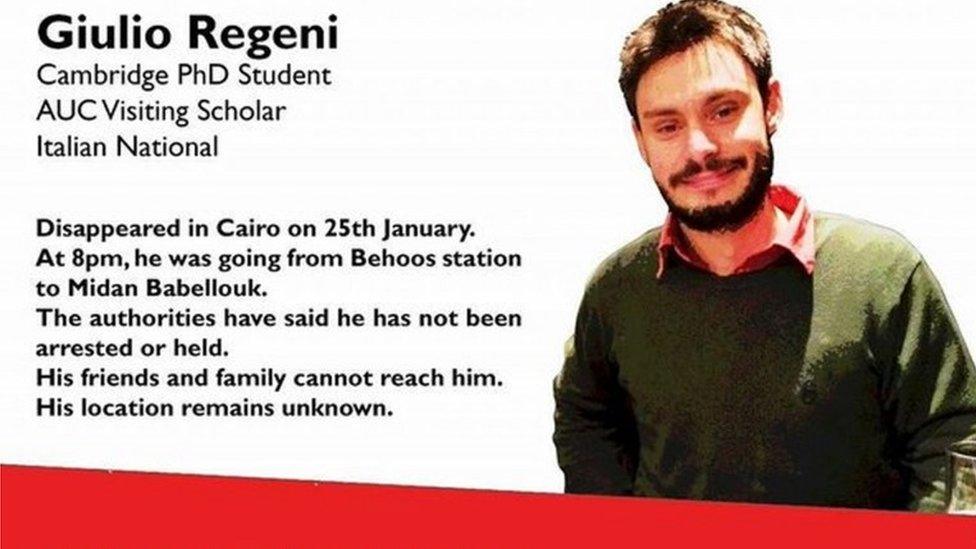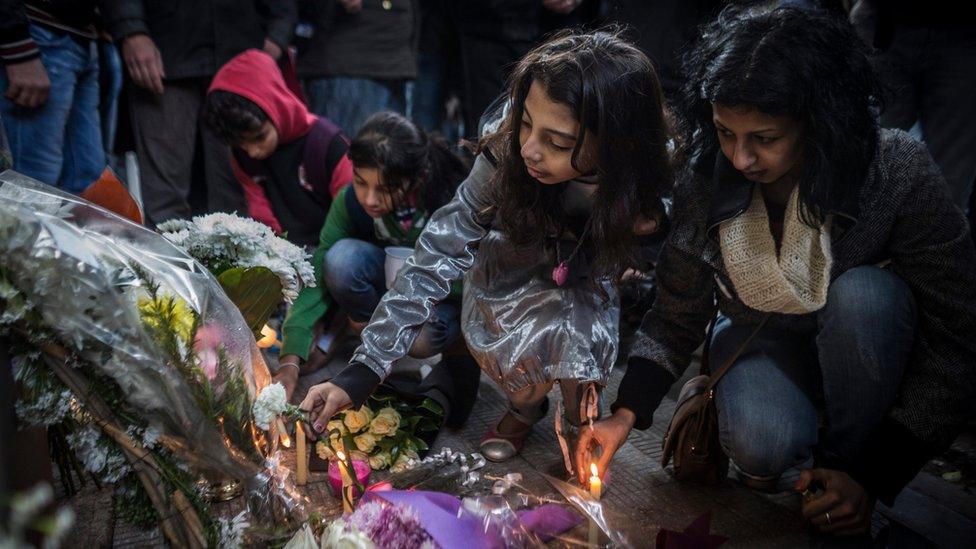Giulio Regeni: Egypt rejects police role in student's death
- Published

People who were searching for Giulio Regeni posted this image online
Egypt's interior minister has rejected accusations that security forces were involved in the killing of an Italian student in Cairo.
The body of Giulio Regeni, 28, was found on Wednesday, more than a week after he disappeared, with "clear signs" of torture, according to a prosecutor.
There have been claims that police could have had a role in the death.
Italy's foreign minister has said he will not settle for "alleged truths".
Mr Regeni disappeared on the evening of 25 January, the fifth anniversary of the start of the uprising against former President Hosni Mubarak, when there was a heavy police presence in Cairo.
The researcher, a PhD student at the University of Cambridge, was carrying out research on trade unions and labour rights in Egypt, a sensitive topic in recent years.
The perils of reporting in Sisi's Egypt
Spotlight on human rights in Egypt
Egypt's Interior Minister, Magdi Abdel Ghaffar, was quoted by the Reuters news agency as saying: "There are many rumours repeated on pages of newspapers insinuating the security forces might be behind the accident. This is unacceptable. This is not our policy."
Officials have stepped up a crackdown on dissent in Egypt, and human rights groups have accused security forces of torturing detainees, committing killings with impunity and detaining suspected activists or Islamists without ever reporting their arrests.
Rumours about a possible involvement of Egypt's police in the death have been reported by the Italian press, activists and opposition groups.
Mr Ghaffar said that the Egyptian security agencies are "known for (their) integrity and transparency" and that the student's killing was a "criminal incident for sure", AP reported.
'Alleged truths'
Italy's government has stepped up the pressure on Egypt to find those responsible for Mr Regeni's death.
Foreign Minister Paolo Gentiloni told La Repubblica newspaper that Rome wanted "the real perpetrators to be discovered and punished according to the law".

Tributes to Giulio Regeni have been placed outside the Italian embassy in Cairo

Egypt's interior minister rejected allegations against the police published in the media
Mr Regeni disappeared after leaving his home to meet a friend in an area of Cairo near Tahrir Square, the symbolic centre of the 2011 uprising. His body was found beside a road in the capital's western outskirts.
The researcher, a student at Cambridge's department of politics and international studies, was a visiting scholar at the American University in Cairo (AUC).
Senior Egyptian prosecutor Ahmad Nagi said last week that Mr Regeni's body had bruises, knife wounds and cigarette burns.
Egypt's privately-owned Al-Yawm al-Sabi news website, quoting the Egyptian Forensic Medicine Authority, said on Monday that Regeni "died instantly" after being hit with a "sharp tool on the back and front of his head".
But Italy's Interior Minister Angelino Alfano said on Sunday that a second autopsy performed in Italy "confronted us with something inhuman, something animal".
"It was like a punch in the stomach and we haven't quite got our breath back yet," he added.
La Repubblica reported that, as well as being systematically beaten, Regeni had his finger and toe nails pulled out in a pattern of torture which the newspaper said suggested that he had been identified as a spy.